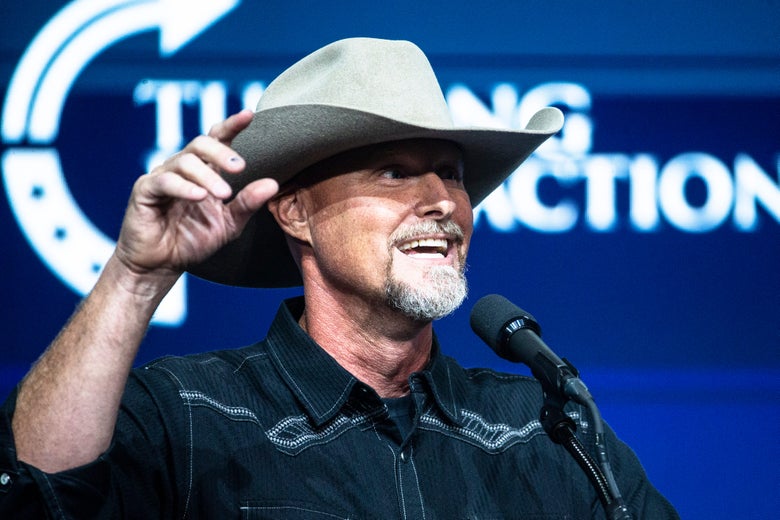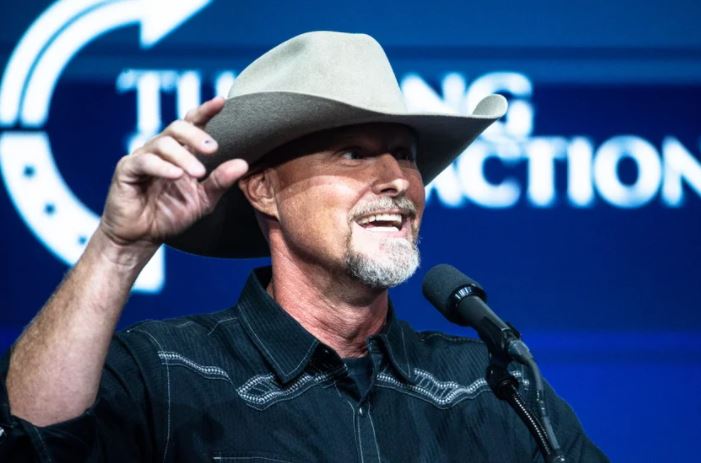The Association’s funding sources and political affiliations are suspect. That hasn’t stopped them from lobbying Congress and tanking police reforms.

This week, the National Sheriffs Association held their Winter Conference in Washington, D.C. The meeting is held in the nation’s capital every year, but this year a new event was added to the agenda: a “Hill Day,”in which the NSA arranged meetings between county sheriffs and their congressional representatives to discuss issues that are “meaningful to Sheriffs,” ranging from policing issues to medical care.
Since the summer of 2020, when the nation erupted into protest over police violence, police unions have been hard at work using their immense political power to thwart reform efforts. While police unions generally operate locally, there are state-wide and nation-wide organizations that purport to represent the interests of various law enforcement groups: police chiefs, police captains, and sheriffs. Sheriffs, in particular, have displayed immense resistance to efforts to change policing. Yet the national association that ostensibly represents their interests, and lobbies Congress on their behalf, remains under-examined and under-studied.
Since then, sheriffs, under the leadership of the National Sheriffs Association (NSA), have gone on the warpath, pushing false narratives about a “war on cops” and whipping up unsubstantiated panic about increasing crime. In one instance, Louisiana Sheriff Vernon Stanforth, the President of the NSA, went on a local news station to call for federal support in arresting alleged shoplifters because they were “terrorizing their communities.” His request was backed up by a general NSA call for an action by the Biden administration on retail theft (which isn’t a federal crime).
The next day, Executive Director and CEO of the NSA Jonathan Thompson – who is a paid employee of the organization and not an elected sheriff – went on Fox News to complain about the NFL’s discretionary donations to groups engaged in criminal system reform through the “Inspire Change” initiative. Thompson topped his complaints with a veiled threat that players should “spend one night in a cruiser or a jail to see the horrendous effects of runaway crime.”
How did the sheriffs come to be such a unified front against policing reform? Through the work of the National Sheriffs Association, a big-tent organization that nominally represents the interests of county sheriffs. Part of that representation requires the creation and reiteration of a mythology about sheriffs that serves to secure their place in the American pantheon of law enforcement organizations. This objective is even written into their “constitutional charter.” They mean it. When the county commissioners of Loudoun County, Virginia, considered reducing the role of the county sheriff by creating a police force (that would be under the control of the mostly Democrat county government), the NSA was there to argue forcefully against it. They claimed that sheriffs were more cost-efficient and better at patrol and policing than county-run police forces, and called the county government “political hacks.”
While the NSA claims to be nonpartisan, its leadership has proven to be less so, with the most recent slate of leaders leaning further to the right than past leadership. At least one member of the Executive Committee – Sheriff Chris West of Oklahoma — was at the Capitol on Jan. 6. At least three others are members of Protect America Now, a far-right sheriff’s organization, or the Constitutional Sheriffs and Peace Officers Association, a group that believes sheriffs are the ultimate arbiters of the constitution. The current chair of the Government Affairs Committee is Collin County, Texas, Sheriff Jim Skinner, who was responsible for the high-profile jail death of Marvin Scott III, whom deputies killed by restraining him, placing a hood over his head, and dousing him with pepper spray. As part of the committee, Skinner is tasked with developing the NSA’s policy positions on law enforcement and homeland security in addition to representing the Association before Congress and the White House. The NSA has also consistently lobbied in favor of civil asset forfeiture, which, despite bipartisan opposition, remains the law in Texas.
While the NSA officially disavows connections between corporate sponsors and their policies, the degree of corporate funding is shadowy and belies their alleged neutrality. The Association is a 501(c)(4) organization, which is not required to disclose its donor and lobbying expenditures publicly. What we do know is that the NSA manages to raise in the neighborhood of $8 million in “dark money” every year. (A spokesperson from the NSA says the money is a mix of member dues, government grants, and corporate sponsorships). The available public information about funding indicates that the NSA is beholden to the corporations that have built the prison industrial complex and produce billions of dollars in profits off the backs of people in cages. Such for-profit industries, which include telecommunications companies like Verizon, GTL, PayTel and correctional health care companies as well as more anodyne corporations like Airbnb and The Home Depot can purchase access to sheriffs. For top donors their purchase includes a “reception” with NSA leadership as well as a “Private Dinner with Members of NSA’s Executive Committee and Headquarters’ Leadership.”
For example, this year, ex-police officer named Matthew Griffin, who wrote a book about mental health for law enforcement, gave the keynote speech and was made an “honorary sheriff.” Griffin, who has never been a sheriff, served as a police officer in New Hampshire, but left after he was added not once, but twice, to a statewide list of officers who committed misconduct. According to one news source, Griffin at one point claimed to be a “reserve officer” for an unincorporated New Hampshire town and worked as a police trainer. His speech was sponsored by Axon,the company that makes body cameras and Tasers, and, according to a 2021 Washington Post article, was also a police trainer .
There is further evidence that the NSA courts corporate sponsorship in exchange for sheriff sponsorship. In 2016, the NSA took $350,000 from Purdue Pharma, which it used to distribute naloxone overdose kits and train deputies to reverse overdoses. The Association also took an undisclosed amount from Alkermes, Inc, the manufacturer of Vivitrol, an overdose prevention drug, to “raise awareness among law enforcement of the alarming opioid epidemic.” (ProPublica reported that Alkermes has heavily marketed Vivitrol to law enforcement and judges because, while less effective than methadone and Suboxone, the shot blocks the ability of people to feel the pleasurable high of opiates.) The NSA also spent over $500,000 to air televisions ads featuring sheriffs voicing their opposition to imported prescription drugs, which was the subject of a bipartisan proposal to bring down the costs of medicines in the U.S.
Another path is possible. In California, district attorneys have split away from the state prosecutor’s association because of its retrograde positions, which is a first step towards disentangling dark money, corporate interests, and an industry that has profited from caging people. It’s time for sheriffs to do the same.


